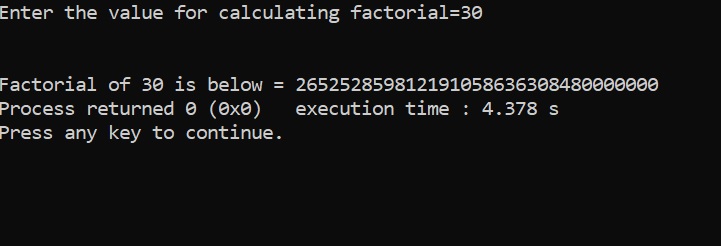Example to show working of above code for n = 5
n = 5, j = 2, a[0] = 1, a[1000] = { 1, 0, 0, ……….0 }
len =1, c = 0, num =0
while( j < = n) → ( 2 < = 5) becomes True
again it initializes c = 0 and num = 0
while ( c < len ) → (0 < 1 ) becomes True for 1st iteration
a[c] = a[c] * j; → a[0] = 1 * 2 = 2 → a[1000] = { 2, 0, 0, ….., 0}
a[c] = a[c] + num; → a[0] = 2 + 0 = 2 → a[1000] = { 2, 0, 0, ….., 0}
num = a[c] / 10; → num = 2 / 10 = 0
a[c] = a[c] % 10; → a[0] = 2 % 10 = 2 → a[1000] = { 2, 0, 0, ….., 0}
c++; → c = 1
while ( c < len ) → (1 < 1 ) becomes False for 2nd iteration
Hence moving next instruction
while(num != 0) → False as num = 0 ( no entry inside loop)
j++; → j = 3 ( again moving towards first while loop )
while( j < = n) → ( 3 < = 5) becomes True
again it initializes c = 0 and num = 0
while ( c < len ) → (0 < 1 ) becomes True for 1st iteration
a[c] = a[c] * j; → a[0] = 2 * 3 = 6 → a[1000] = { 6, 0, 0, ….., 0}
a[c] = a[c] + num; → a[0] = 6 + 0 =6 → a[1000] = { 6, 0, 0, ….., 0}
num = a[c] / 10; → num = 6 / 10 = 0
a[c] = a[c] % 10; → a[0] = 6 % 10 = 6 → a[1000] = { 6, 0, 0, ….., 0}
c++; → c = 1
while ( c < len ) → (1 < 1 ) becomes False for 2nd iteration
Hence moving next instruction
while(num != 0) → False as num = 0 ( no entry inside loop)
j++; → j = 4 ( again moving towards first while loop )
while( j < = n) → ( 4 < = 5) becomes True
again it initializes c = 0 and num = 0
while ( c < len ) → (0 < 1 ) becomes True for 1st iteration
a[c] = a[c] * j; → a[0] = 6 * 4 = 24 → a[1000] = { 24, 0, 0, ….., 0}
a[c] = a[c] + num;→ a[0] = 24 + 0 = 24→ a[1000] = { 24, 0, 0, ….., 0}
num = a[c] / 10; → num = 24 / 10 = 2
a[c] = a[c] % 10; → a[0] = 24 % 10 = 4 → a[1000] = { 4, 0, 0, ….., 0}
c++; → c = 1
while ( c < len ) → (1 < 1 ) becomes False for 2nd iteration
Hence moving next instruction
while(num != 0) → becomes True as num = 2 which is not zero
a[len] = num % 10; → a[1] = 2 % 10 = 2 → a[1000] = { 4, 2, 0, …, 0}
num = num / 10; → num = 2 / 10 = 0
len++; → len = 2 ( clearly len is now 2 )
j++; → j = 5 ( again moving towards first while loop )
while( j < = n) → ( 5 < = 5) becomes True
again it initializes c = 0 and num = 0
while ( c < len ) → (0 < 2 ) becomes True for 1st iteration
a[c] = a[c] * j; → a[0] = 4 * 5 = 20 → a[1000] = {20, 2, 0, …, 0}
a[c] = a[c] + num;→ a[0] = 20 + 0 = 20→ a[1000] = {20, 2, 0, …, 0}
num = a[c] / 10; → num = 20 / 10 = 2
a[c] = a[c] % 10; → a[0] = 20 % 10 = 0→ a[1000] ={0, 2, 0, …, 0}
c++; → c = 1
while ( c < len ) → (1 < 2 ) becomes True for 2nd iteration
a[c] = a[c] * j; → a[1] = 2 * 5 = 10 → a[1000] = {0, 10, 0, …, 0}
a[c] = a[c] + num;→ a[1] = 1 + 2 = 12→ a[1000] = {0, 12, 0, …, 0}
num = a[c] / 10; → num = 12 / 10 = 1
a[c] = a[c] % 10; → a[1] = 12 % 10 = 2→ a[1000] ={0, 2, 0, …, 0}
c++; → c = 2
while ( c < len ) → (2 < 2 ) becomes False for 3rd iteration
Hence moving next instruction
while(num != 0) → becomes True as num = 1 which is not zero
a[len] = num % 10; → a[2] = 1 % 10 = 1 → a[1000] = { 0, 2, 1, …, 0}
num = num / 10; → num = 1 / 10 = 0
len++; → len = 3 ( clearly len is now 3 )
j++; → j = 6 ( again moving towards first while loop )
while( j < = n) → ( 6 < = 5) becomes False, as this is the top most loop, on failure of condition we move out of while body.
Moving next instruction
len--; len = 2( as in array { 0, 2, 1, …, 0 } we have value at index 0, 1 and 2 which is 120( factorial of 5)
while(len >= 0) → ( 2 >= 0) → True
printf("%d", a[len]); → print(a[2]) → 1
len--; → len = 1
while(len >= 0) → ( 1 >= 0) → True
printf("%d", a[len]); → print(a[1]) → 2
len--; → len = 0
while(len >= 0) → ( 0 >= 0) → True
printf("%d", a[len]); → print(a[0]) → 0
len--; → len = -1
while(len >= 0) → ( -1 >= 0) → False, and we exit from final while loop,
so the final value is 120 ( factorial of 5)
As we took array size 1000, i.e. a[1000] we can find out factorial of any number whose resultant values are less than or equal to a[1000], as we have seen that factorial of 30! = 2 6 5 2 5 2 8 5 9 8 1 2 1 9 1 0 5 8 6 3 6 3 0 8 4 8 0 0 0 0 0 0 0 in total 33 digits which became possible only because of array size.

